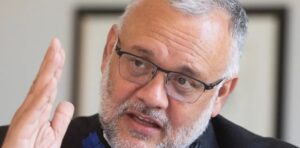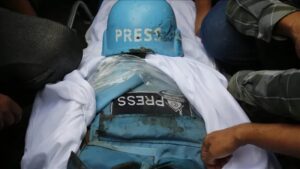By Imraan Buccus
Frantz Fanon who born in the Caribbean island of Martinique, studied in France and then joined the struggle for the liberation of Algeria from French colonialism. Today he is widely considered to be the most significant thinker to have arisen from the decolonisation movement in Africa. The greatest living African intellectuals, usually considered to be the Ugandan Mahmood Mamdani, and the Johannesburg based Cameroonian Achille Mbembe, still base much of their work on Fanon’s original insights.
Fanon’s work is so rich that every time one returns to it there are new insights. The Wretched of the Earth is uncompromising and powerful his critique of the post-independence elites is.
Fanon does not hold back. His description of the new elites that come to dominate after independence is absolutely scathing. He is equally scathing of their nationalist ideology and could not be clearer that the battle for a decent society cannot be limited to nationalism. For Fanon if nationalism is not supplemented with a social consciousness it will quickly collapse into gross forms of corruption and authoritarianism.
Fanon paints a bleak picture of a national elite that agitates for nationalisation because “To them, nationalization quite simply means the transfer into native hands of those unfair advantages which are a legacy of the colonial period.” In other words, this new elite, which has emerged from among the formerly oppressed, has no real social vision. It aims to replace the coloniser for its own private benefit rather than to build a just society. Instead of being an instrument of social advancement “civil servants very soon began to sabotage the national economy”. Reading this today immediately takes one’s mind to the disaster unfolding at Eskom, SAA, the SABC, and Transnet.
Fanon insists that the mission of this new elite “has nothing to do with transforming the nation; it consists, prosaically, of being the transmission line between the nation and a capitalism”. He explains that as a new elite enriches itself at the expense of the majority it will adopt an ever more extreme form of nationalist rhetoric in order to try and keep the majority on its side. The result of this will be that the elites use a language that moves from anti-colonial nationalism to “ultra-nationalism, to chauvinism, and finally to racism”. Any South Africa reading these lines today will immediately think of the Bell Pottinger scripted narrative driven by the Zuma faction of the ANC, and Black First Land First, as well as the more recent forms of ultra-nationalism espoused by the likes of Ace Magashule and the EFF.
Fanon writes that once the politics of the national elites has collapsed into outright chauvinism the masses will follow. However, the masses do not turn against their former oppressors. Instead they turn against migrants from other African countries, against other poor people. Again, our society follows Fanon’s script almost exactly. Xenophobic violence, often tacitly encouraged by elite figures, has become an everyday reality.
The result of all this is that because the national elite “is preoccupied with filling its pockets as rapidly as possible … the country sinks all the more deeply into stagnation”. However Fanon warns that this stagnation is not permanent. “The people stagnate deplorably in unbearable poverty; slowly they awaken to the unutterable treason of their leaders.” At this point popular protest starts to eat away at the legitimacy of the ruling party, and the elites that it represents. The national elites respond by turning to dictatorship, and justifying it by constantly presenting themselves as involved in an entirely fictitious battle against colonialism.
Fanon writes that “Privileges multiply and corruption triumphs, while morality declines. Today the vultures are too numerous and too voracious in proportion to the lean spoils of the national wealth. The party, a true instrument of power in the hands of the bourgeoisie, reinforces the machine, and ensures that the people are hemmed in and immobilized. The party helps the government to hold the people down. It becomes more and more clearly anti-democratic, an implement of coercion.” Reading this one immediately thinks of Marikana, and the assassination of grassroots political activists in Durban.
Reading Fanon in 2019 is an eerie experience. Fanon gives an almost perfect account of the collapse of the ANC into outright looting in the Zuma period, and then its turn to extremist nationalist rhetoric to try and mask its treason, and sustain popular support. His account of an elite shamelessly stealing from the poor, while the poor turn on each other, reads as if it were written yesterday.
Rereading Fanon in our current crisis; it is as clear as daylight that the Zuma faction of the ANC, the Economic Freedom Fighters, and Black First Land First are, precisely, the people that Fanon warned us against. Their use of authoritarianism and hyper-nationalist forms of political discourse to mask and justify looting by a predatory elite is exactly the kind of politics that Fanon shows to be the greatest threat to African aspirations.
But reading Fanon is not all just doom and gloom. Fanon also lays out a clear sense of an alternative politics. The first step is that national consciousness needs to be replaced with social consciousness. What Fanon means is that while nationalism can inspire anti-colonial resistance it is not capable of building a just and democratic society after independence. For this project a genuine social vision, a vision of a just society in which human dignity is recognised, is required.
Secondly Fanon is very clear that the masses need to remain organised and mobilised after independence in order to be able to ensure that democracy expands beyond period elections. For Fanon it is popular democratic action by the masses that offers the best protection against a predatory elite that will, inevitably, collapse into authoritarianism, and the use of extreme nationalism, to protect its position and power.
Fanon gives us an extraordinarily powerful warning about the dangers of a predatory elite masking its avarice with increasingly extreme forms of nationalism. He gives us a the analytical clarity to be able to accurately understand and describe the Zuma faction of the ANC and the EFF. No one who has read Fanon could ever entertain the idea that these social forces are in any way ‘left’ or ‘progressive’. On the contrary it becomes clear that there are deeply reactionary and very, very dangerous.
But Fanon also gives us some hope for a way out. That hope is premised on a credible social vision, and the forms of democratic mass organisation that can advocate for it. In the 1970s and 1980s millions of people were organised and mobilised behind a progressive vision for the future. We need to recover this sense of hope, and a sense of democratic engagement that extends elections.
If there is one book that you read this year make it Frantz Fanon’s The Wretched of the Earth.
Buccus is Al Qalam editor, research fellow in the School of Social Sciences at UKZN and academic director of a university study abroad program on political transformation.





